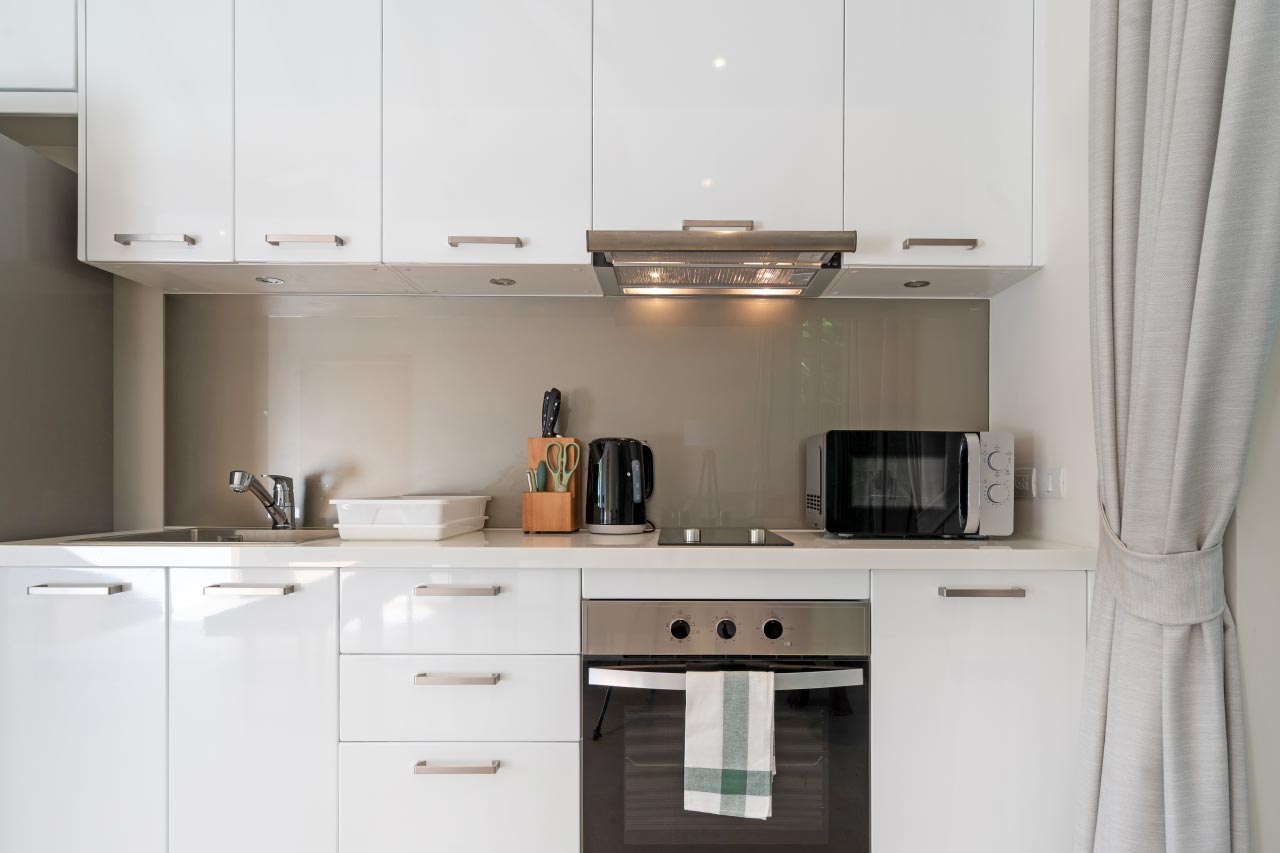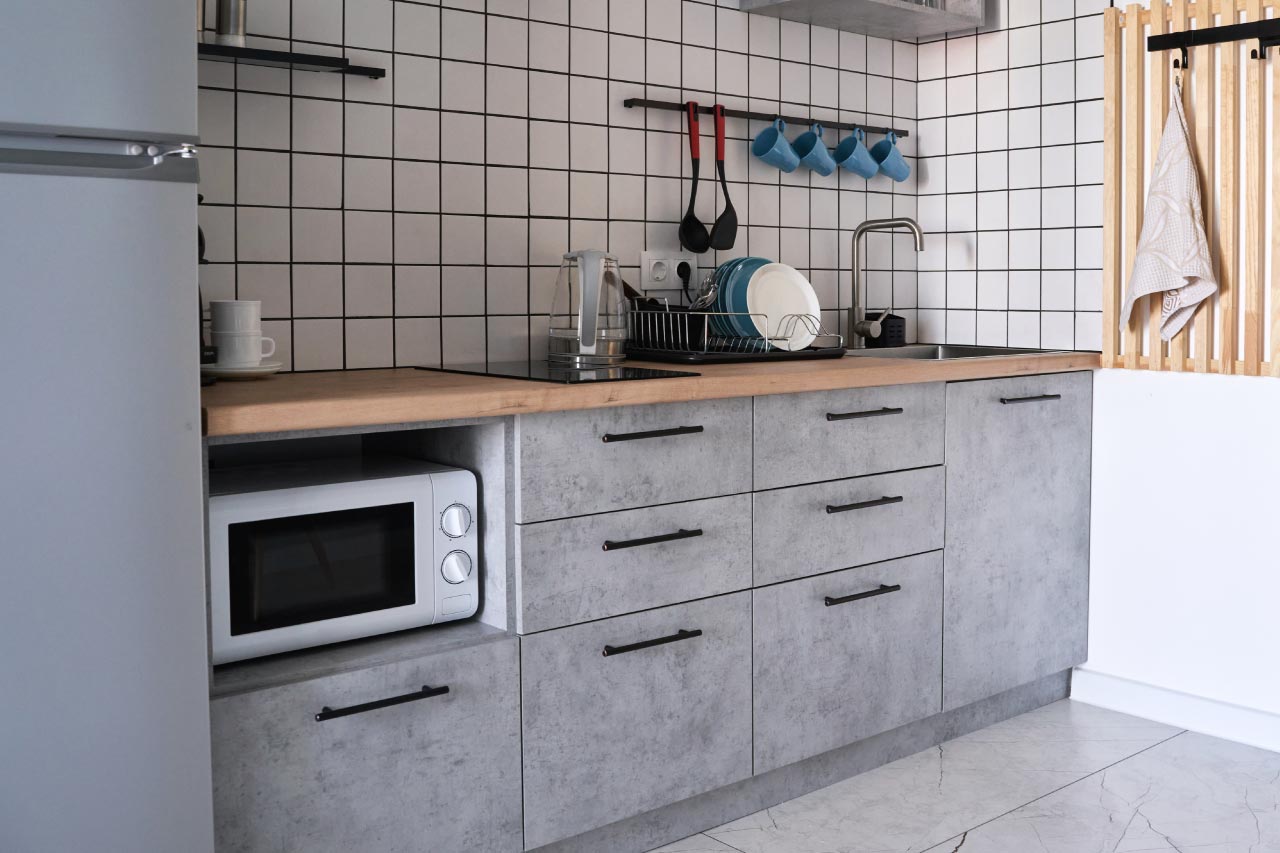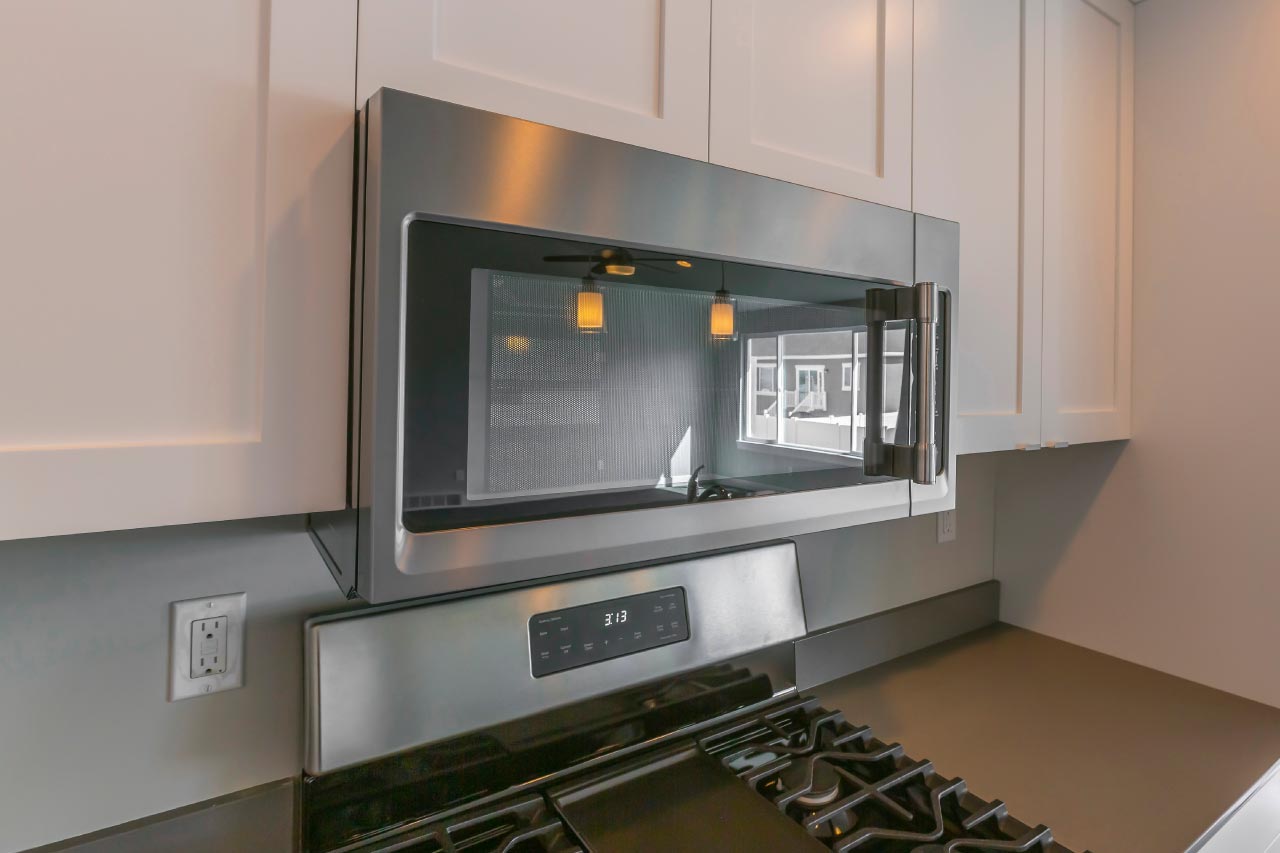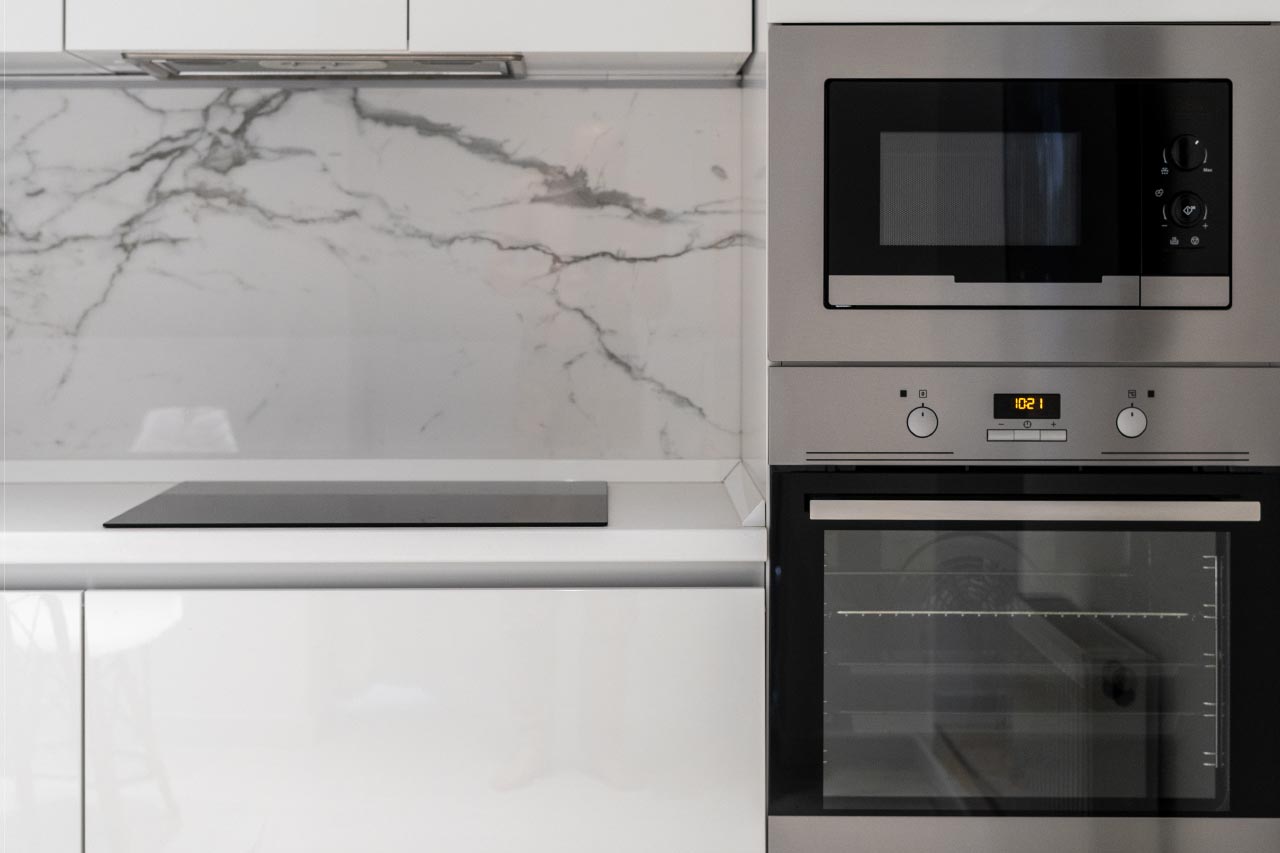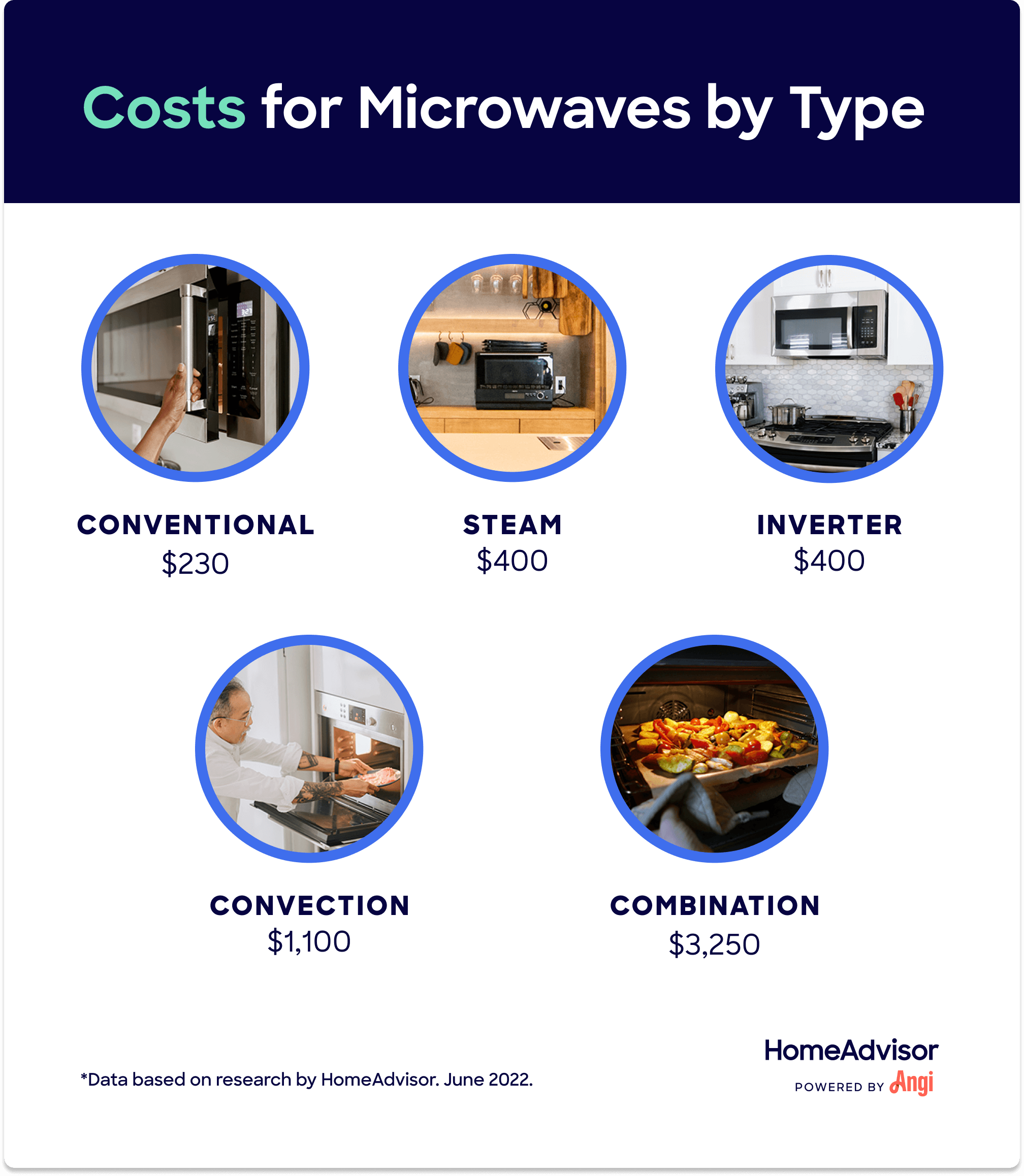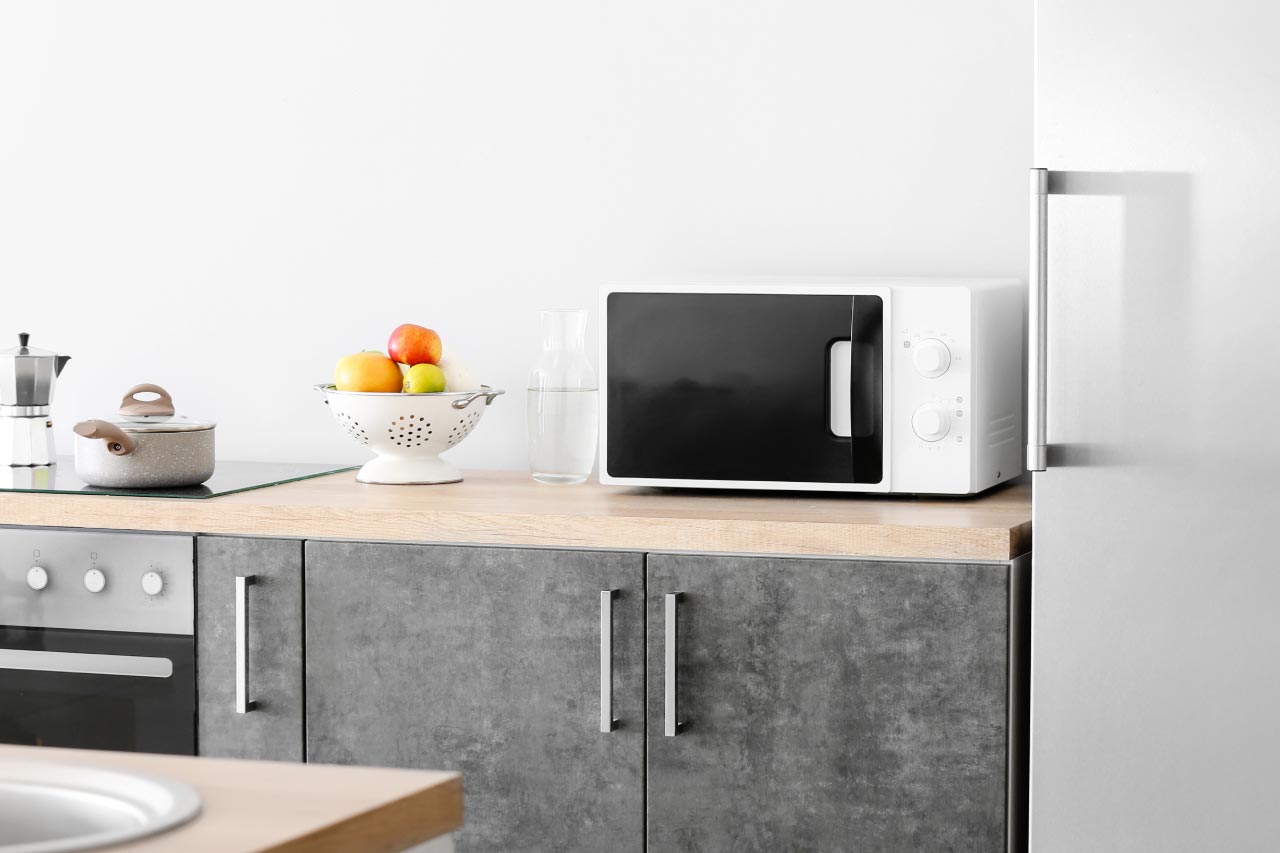How Much Does a Microwave Installation Cost?
Typical Range:
$109 - $192
Typical Range:
$109 - $192
Cost data is based on actual project costs as reported by 1,633 HomeAdvisor members. Embed this data
.
.
.
.
.
.
.
.
.
.
.
.
.
.
.
.
.
.
.
.
.
.
.
.
.
.
.
.
.
.
•
•
•
•
Updated October 27, 2022
Written by HomeAdvisor.The cost of a microwave installation is around $150 for labor alone, with most installations costing between $109 and $192. However, built-in microwaves are more costly to install, ranging from $200 to $2,650. Adding an electrical outlet, venting duct, and custom cabinetry can add $500 to $2,000 to your project total.
Let's calculate cost data for you. Where are you located?
Where are you located?
| National Average | $150 |
| Typical Range | $109 - $192 |
| Low End - High End | $75 - $340 |
Cost data is based on actual project costs as reported by 1,633 HomeAdvisor members.
How much do microwaves cost? Like with many other appliance installation costs, location is one of the most important cost factors for microwave installation. That’s because location determines the job difficulty, what tools are necessary, and how much time installation takes. For example, a standard countertop microwave takes less time, effort, and tools to install than a built-in model and thus costs less.
| Microwave Location | Average Cost Range (Labor Included) | Average Cost (Labor Included) |
|---|---|---|
| Countertop | $50 – $320 | $190 |
| Below-cabinet | $140 – $450 | $300 |
| Over-range | $150 – $570 | $360 |
| Built-in | $290 – $5,000 | $2,650 |
Countertop microwaves cost between $50 and $320 for both the microwave and installation. The low price is because you’re essentially only paying for the microwave. There’s no installation required other than plugging the unit into an outlet.
Below-cabinet microwaves cost between $140 and $450 for both the microwave and installation. These units are easy to install, sitting suspended in brackets beneath a cabinet or counter, letting you make the most of otherwise wasted space without losing countertop space.
An over-the-range microwave costs around $150 to $570 to install. Over-the-range microwaves attach to the wall through a mounting plate screwed into one or more wall studs. Most of the microwave's weight rests on the plate, but you can fit down two to three machine screws through the wall cabinet into the top of the microwave to draw it up for an even tighter fit. A dedicated outlet inside the cabinet above usually supplies the electricity to run the microwave.
A built-in microwave installation costs between $290 and $5,000. Where you fall in this cost range depends on the complexity of the installation. Swapping like-for-like is the least expensive option, and you'll pay considerably more if an extensive cabinet installation or customization is necessary.
Built-in microwaves offer a great look to your kitchen and keep it stylish by fitting seamlessly into your walls or cabinetry. They also help save valuable counter space.
Your location plays a significant role in the cost of microwave installation. Expect to pay a higher rate if you live in a big metropolitan city with a higher standard of living. The best way to determine the actual cost is to get quotes from several microwave installation pros in your area.
See the costs of installing a microwave by location below:
Boston: $180
New York: $140
Chicago: $140
Atlanta: $140
Houston: $120
Kansas City, MO: $150
Denver: $210
The cost of installing an over-the-range microwave varies depending on several factors. For example, expect to pay more if the installation includes adding new venting ducts. Removing a range hood and replacing it with an over-the-range microwave also costs more than a simple installation that doesn’t involve removing the range hood first.
If there’s none already present, installing ductwork costs around $300 to $600. You can get ductless microwaves, but ducted models provide better ventilation.
Replacing existing ductwork costs about $150 to $300. You might need to replace ductwork to fit with a new microwave unit.
Replacing your range hood with an over-the-range microwave costs about $200 to $400. This covers labor but not the price of the microwave. The higher cost estimate applies if you also need to install new ductwork. The total cost will be less if you can connect the existing ductwork to your new unit.
Because an over-the-range microwave offers the dual functionality of cooking and venting, replacing your range hood with this microwave model could be a worthwhile upgrade. The cost of installing a new over-the- range-microwave also runs less than the cost to install a range hood.
You may need to budget for electrical upgrades for your microwave installation. An over-the-range microwave installation, for example, often requires installing a dedicated 120-volt 20-amp circuit. A dedicated circuit installation costs between $570 and $1,000.
A handyperson can install a microwave in most circumstances, but you’ll need to hire a local electrician for any electrical work.
Installing a new built-in microwave costs between $290 and $5,000. The total price you pay depends on the level of customization needed. Consult with a local handyperson or carpenter to get an accurate quote and have the job done right.
Installing a trim costs around $220 to $580, including materials and labor. The trim kit costs approximately $120 to $280, while the installation labor costs around $100 to $300. Trim kits frame the microwave to provide an integrated look and help vent out heat to the front.
If your microwave is hidden in a cupboard or drawer, expect to pay approximately $250 to $430 for cabinet preparation and microwave installation. Keep in mind that this doesn't include the cost of the microwave itself.
Microwave mounting kits cost between $20 and $60. These kits typically contain brackets to anchor your microwave to the wall or below a countertop. Some include a shelf for the microwave to rest on. More expensive units include a second shelf below the microwave for storing small items. You can also find models with utensils or mug hooks underneath to help you make the most of vertical space if you have a small kitchen.
Other than location, several other factors will impact the cost to install a microwave. This includes modifying cabinets and disposing of your old unit if you have one. Here’s how each factor can affect prices.
Installing a new electrical outlet costs between $130 and $300. If you don’t have a sufficient power outlet near the location you’re putting up your new microwave, you’ll need to hire a local electrician to install one for you.
Customizing cabinets costs between $500 and $1,200 per linear foot. This step may be necessary if you install a built-in or below-cabinet microwave.
Disposing of your old microwave costs$20 to $50 on average. Some installation pros, however, may include it as a free add-on to the installation.
A professional microwave installation costs between $50 and $100 per hour. Who you get to install your microwave depends on the type of installation. A local handyperson can handle most installations, but custom cabinetry may require the services of a carpenter. Similarly, if you need to have electrical work done, you'll need to hire an electrician near you.
Some stores also offer installation services. For a standard over-the-range microwave, most stores charge between $100 and $180 for delivery and installation. However, a store installation can be more costly than hiring a handyperson. Plus, a handyperson may be able to source the microwave at a trade price, helping you save money on your purchase.
Microwave installation costs can vary depending on the type. A basic conventional model with minimal features can cost as little as $50. On the other end of the scale, combination microwaves with all the bells and whistles can cost up to $5,000.
A conventional microwave can cost anywhere from $50 to $400, depending on the brand. This is the standard microwave you'll find in most home kitchen countertops and is usually the most budget-friendly. A conventional microwave performs basic functions like heating up or defrosting food, but you can't use it for cooking food.
A steam microwave costs between $200 and $600. This type of microwave comes with a purpose-built steamer on top of the other features of a standard microwave. The combination of steam and microwave technology allows you to cook food faster. Cooking with steam also allows your food to retain most of its original flavor and nutrients.
Inverter microwaves cost between $200 and $600. This microwave model uses an inverter circuit to supply power, unlike standard microwaves that use a transformer. The inverter supplies power at a constant level throughout the entire cooking duration, which helps to prevent overheating, loss of flavor, and destruction of food structure.
Convection microwaves cost between $200 and $2,000. The model heats food like a regular microwave but also has an extra heating element and fan that circulates hot air inside the oven to brown or crisp food surfaces.
Combination microwaves cost approximately $1,500 to $5,000. These microwaves have several cooking modes in one appliance, including conventional (microwaves), convection, and steaming. When cooking, you can opt to use one mode at a time or combine two or more for even faster cooking.
The brand you choose has a significant impact on the microwave price. Figure out what features you must have and any that would be nice but aren't essential. Then, look for deals on brands and models with those features to find a unit that fits your budget.
| Microwave Brand | Average Price Range per Unit | Average Price per Unit |
|---|---|---|
| Frigidaire | $350 – $1,500 | $930 |
| General Electric | $100 – $1,500 | $800 |
| LG | $150 – $1,000 | $580 |
| Samsung | $150 – $600 | $380 |
| Wolf | $500 – $5,000 | $2,750 |
A countertop model doesn't require professional installation. Handy DIY-ers can also easily install microwaves under a shelf or cabinet. However, more complex jobs—such as built-in and over-the-range microwaves—require professional installation, as does any installation that requires electrical installation.
Unless you're an experienced DIY-er with a high skill level and all the right tools, hire a local microwave installation pro to get the job done right and safely.
A microwave installation pro will take one to three hours on average to install a microwave. However, additional work, such as installing new electrical outlets and circuits, can add two to three more hours to the installation time. More advanced work, like customizing cabinets, can take several days to complete.
Yes, over-hood microwaves need venting since they usually take the place of a range hood. Homeowners typically have two venting options: You can opt for a recirculating vent microwave that pulls in air into its filters and then recirculates it back into the kitchen, or you can go for an externally vented microwave model that draws in air and then directs it into an exhaust duct that leads to the outside of your house.
You can dispose of old microwaves using a waste recycling service that comes to your home on a pre-arranged date to collect your old appliance. Some local garbage collectors also have electrical waste recycling locations where you can take your microwave. You may even find that the microwave manufacturer offers a take-back or recycling incentive program.
No, only those with vents built into the bottom can go over the range to perform the dual role of a microwave and a hood vent. Check the manufacturer's specifications and ask questions if necessary when buying a microwave to find out if it can go over the range.
No, it's not advisable to build any microwave into your cabinets. For example, don't use a countertop microwave as a built-in one. Built-in microwaves are sized differently and have different venting setups to ensure adequate airflow and ventilation. Building a countertop into your cabinet won't have sufficient ventilation as the vents will be blocked, which can cause moisture damage and create a significant fire hazard.
